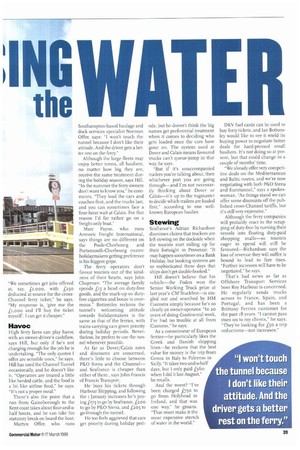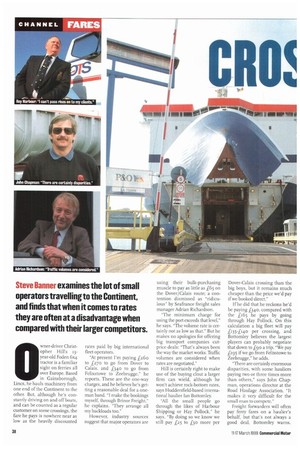NO WATER
Page 41

Page 40

If you've noticed an error in this article please click here to report it so we can fix it.
the
0 wner-driver Christopher Hill's '3year-old Foden 6x4 tractor is a familiar sight on ferries all over Europe. Based in Gainsborough, Lincs, he hauls machinery from one end of the Continent to the other. But, although he's constantly driving on and off boats, and can be counted as a regular customer on some crossings, the fare he pays is nowhere near as low as the heavily discounted
rates paid by big international fleet operators.
"At present I'm paying £260 to £270 to go from Dover to Calais, and £340 to go from Felixstowe to Zeebrugge," he reports. These are the one-way charges, and he believes he's getting a reasonable deal for a oneman band. "I make the bookings myself, through Brinor Freight," he explains. "They arrange all my bacldoads too."
However, industry sources suggest that major operators are using their bulk-purchasing muscle to pay as little as £65 on the Dover/Calais route; a contention dismissed as "ridiculous" by Seafrance freight sales manager Adrian Richardson.
"The minimum charge for using the port exceeds that level," he says. "The volume rate is certainly not as low as that." But he makes no apologies for offering big transport companies cutprice deals: "That's always been the way the market works. Traffic volumes are considered when rates are negotiated."
Hill is certainly right to make use of the buying clout a larger firm can wield, although he won't achieve rock-bottom rates, says Huddersfield-based international haulier lan Bottomley.
"All the small people go through the likes of Harbour Shipping or Hay Pollock," he says. "By doing so we know we still pay £25 to £30 more per Dover-Calais crossing than the big boys, but it remains much cheaper than the price we'd pay if we booked direct."
If he did that he reckons he'd be paying £340, compared with the £565 he pays by going through Hay Pollock. On this calculation a big fleet will pay £135-L14o per crossing, and Bottomley believes the largest players can probably negotiate that down to £90 a trip. "We pay £195 if we go from Felixstowe to Zeebrugge," he adds.
"There are certainly enormous disparities, with some hauliers paying two or three times more than others," says John Chapman, operations director at the Road Haulage Association. "It makes it very difficult for the small man to compete."
Freight forwarders will often pay ferry fares on a haulier's behalf, but that's not always a good deal, Bottomley warns. "We sometimes get jobs offered at, say. Li,000, with £250 deducted at source for the crossChannel ferry ticket," he says. "My response is, 'give me the Li,000 and I'll buy the ticket myself. I can get it cheaper."
Havoc
High ferry fares can play havoc with an owner-driver's cashflow, says Hill, but only if he's not charging enough for the job he is undertaking. "The only quotes I offer are sensible ones," he says. Hill has used the Channel Tunnel occasionally, and he doesn't like it. "Operators are treated a little like herded cattle, and the food is a bit like airline food," he says. "It's not a proper meal."
There's also the point that a run from Gains borough to the Kent coast takes about four-and-ahalf hours, and he can take his statutory break on board the boat.
Martyn Offer, who runs Southampton-based haulage and dock services specialist Norman Offer, says: "I won't touch the tunnel because [don't like their attitude. And the driver gets a better rest on the ferry" Although the large fleets may enjoy better terms, all hauliers, no matter how big they are, receive the same treatment during the holiday season, says Hill. "In the summer the ferry owners don't want to know you," he comments. "They load the cars and coaches first, and the trucks last. and you can sometimes face a four-hour wait at Calais. For that reason I'd far rather go on a freight-only boat" Marc Payne, who runs Armoric Freight International, says things are no different on the Poole-Cherbourg and Portsmouth-Cherbourg routes: holidaymakers getting preference is his biggest gripe.
The ferry operators don't favour tourists out of the kindness of their hearts, says John Chapman: "The average family spends L'15 a head on duty-free goods, and the mark-up on dutyfree cigarettes and booze is enormous." Bottomley reckons the tunnel's welcoming attitude towards holidaymakers is the same as that of the ferries, with trains carrying cars given priority during holiday periods. Nevertheless, he prefers to use the tunnel whenever possible.
As far as Dover/Calais rates and discounts are concerned, there's little to choose between P&O Stena and the Chunneland Seafrance is cheaper than either of them, says John Francis of Francis Transport.
He buys his tickets through Harbour Shipping, and following the t January increases he's paying fi75 to go by Seafrance, £200 to go by P&O Stena, and L205 to go through the tunnel.
He too feels aggrieved that cars get priority during holiday peri
ods, but he doesn't think the big names get preferential treatment when it comes to deciding who gets loaded once the cars have gone on. The system used at Dover and Calais means favoured trucks can't queue-jump in that way, he says.
"But if it's unaccompanied trailers you're talking about, then whichever port you are going through—and I'm not necessarily thinking about Dover or Calais—it's up to the tugmaster to decide which trailers are loaded first," according to one wellknown European haulier.
Stewing
Scafrance's Adrian Richardson dismisses claims that truckers are left stewing on the dockside when the tourists start rolling up for their fortnight in Provence: "It may happen sometimes on a Bank Holiday, but booking systems are so sophisticated these days that ships don't get double-booked."
Hill doesn't believe that his vehicle—the Foden won the Senior Working Truck prize at last year's CM Truckfest—is singled out and searched by HM Customs simply because he's so clearly an owner-operator. "In 20 years of doing Continental work, I've had no trouble at all from Customs," he says.
As a connoisseur of European ferries—he particularly likes the Greek and Danish shipping lines—he reckons that the best value for money is the trip from Genoa in Italy to Palermo in Sicily. "It takes two-and-a-half days, but I only paid £560 when I did it last August," he recalls.
And the worst? 'I've been charged £750 to go from Holyhead to Ireland, and that was one way," he groans.
"That must make it the most expensive stretch of water in the world." DKV fuel cards can be used to buy ferry tickets, and Ian Bottomley would like to see it wield its buying power to negotiate better deals for hard-pressed small hauliers. It's not doing so at present, but that could change in a couple of months' time.
"We already offer very competitive deals on the Mediterranean and Baltic routes, and we're now negotiating with both P&O Stena and Eurotunnel," says a spokeswoman. "As things stand we can offer some discounts off the published cross-Channel tariffs, but it's still very expensive."
Although the ferry companies will probably react to the scrapping of duty-frce by turning their vessels into floating duty-paid shopping malls—so tourists eager to spend will still be favoured—Richardson says the loss of revenue they will suffer is bound to lead to fare rises. "Further increases will have to be negotiated," he says.
That's bad news as far as Offshore Transport Services boss Roy Harbour is concerned. He regularly sends trucks across to France, Spain, and Portugal, and has been a Brittany Ferries customer for the past 18 years. "I cannot pass rises on to my clients," he says. "They're looking for £5° a trip reductions—not increases,"












































































































